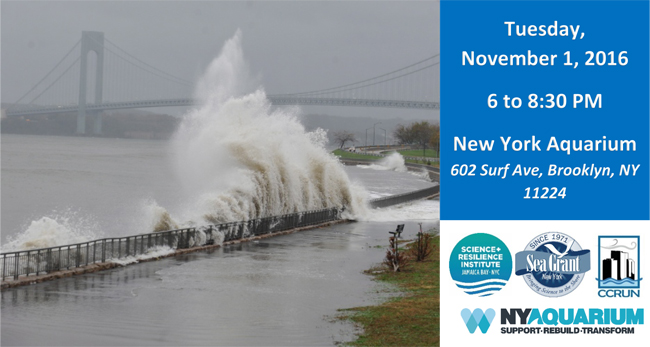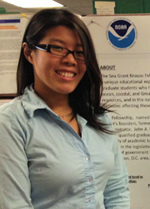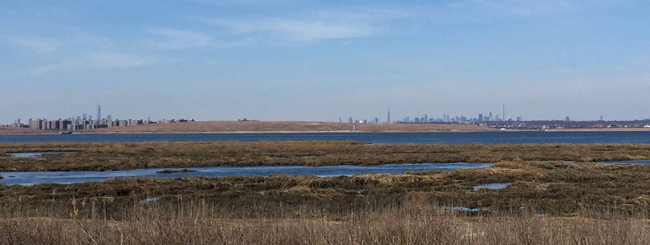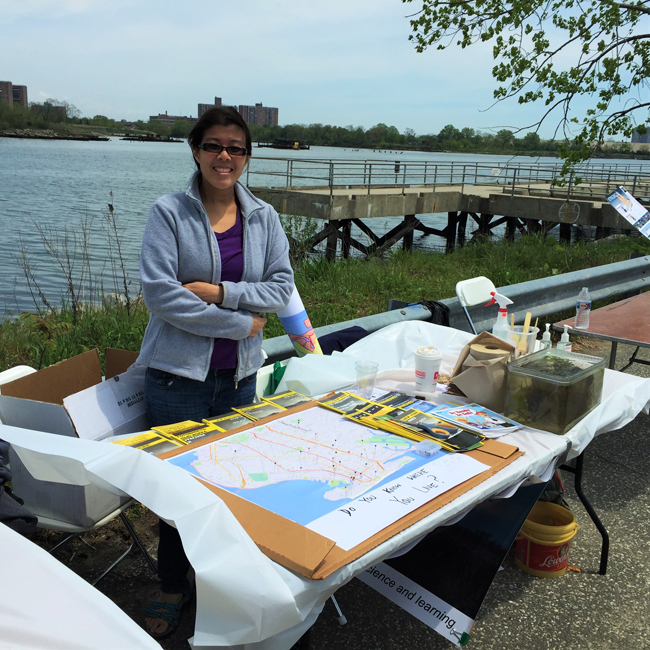NYSG's Jamaica Bay Specialist Profiled by Boating Times Long Island

New York, NY, October 24, 2016 - On Tuesday, November 1st, New York Sea Grant, The Science and Resilience Institute at Jamaica Bay and the Consortium of Climate Risk in the Urban Northeast and the New York Aquarium will host the first in a series of NYC-based climate forums. This inaugural discussion, entitled "From Hurricanes to Snow Storms," will be held at the New York Aquarium (602 Surf Ave, Brooklyn, NY 11224) from 6 to 8:30 PM.
The idea is to remind people to remain prepared for severe storms even after Hurricane season concludes on November 30th. In the winter months we can be impacted by Nor’easters, which, during the forum, a panel of experts, emergency managers and community leaders will differentiate from hurricanes while also providing this season's outlook and identifying ways in which communities can prepare for these storms.
Scheduled to attend will be representatives from the National Oceanic and Atmospheric Administration's National Weather Service New York Weather Forecast Office, NYC Office of Emergency Management, Stevens Institute of Technology and the Wildlife Conservation Society.
Registration for the event, which is free, can be done online. Parking is available. Food and Refreshments will be provided.
Earlier this month, BoatingTimesLI.com published a feature story spotlighting New York Sea Grant's Jamaica Bay Specialist, Helen Cheng, who began her position at Brooklyn College this past February. Here is that profile, "Strengthening Our Coast" ...
 Everyone affected by the battering blows delivered by Superstorm Sandy knows our coasts are fragile in the face of nature’s fury. That’s why people like Helen Cheng are hard at work creating resiliency programs for coastal communities.
Everyone affected by the battering blows delivered by Superstorm Sandy knows our coasts are fragile in the face of nature’s fury. That’s why people like Helen Cheng are hard at work creating resiliency programs for coastal communities.
Cheng is the coastal resilience specialist (Jamaica Bay) for New York Sea Grant, part of the National Sea Grant College Program, in joint partnership with the Science and Resilience Institute at Jamaica Bay. Sea Grant programs promote stewardship of coastal resources by supporting university-based, natural, and social science research on important areas including shoreline protection and water quality. The Science and Resilience Institute at Jamaica Bay was established as a partnership between the City of New York, the National Park Service, and a consortium of nine research universities. works with different groups — coastal communities, public agency decision-makers, research networks — to create and translate knowledge into improvements to the resiliency of estuary life in Jamaica Bay and beyond.
What does a coastal resilience specialist do? Cheng works on engaging and educating the community and on research efforts to enhance resilience. “I serve as a primary technical resource on resilience for coastal communities as it relates to topics such as climate hazards, habitat restoration, planning, sea level rise, and/or coastal storms.”
The Science and Resilience Institute at Jamaica Bay is a new organization, but according to Cheng, it has already been busy. “A community needs assessment has been completed, new research in the Jamaica Bay area has been funded, and partnerships with multiple city, state, and federal agencies have been initiated.”
Cheng grew up in Brooklyn and did her undergraduate studies at Stony Brook University. Thereafter, she earned a M.S. degree in Zoology at the University of New Hampshire and completed a yearlong fellowship in Washington, D.C. at the National Oceanic and Atmospheric Administration before starting with the Institute in 2016.
“I am fortunate to step into a situation where a lot of ground work for creating resilience programs have been laid,” says Cheng. “Superstorm Sandy still looms in the memories of our stakeholders, but I’m looking forward to working with groups to help them prepare for coastal hazards and to be resilient for the next big storm.”

Jamaica Bay is an area that poses unique challenges while serving as a lesson for other coastal communities. Cheng explains: “Jamaica Bay is an urban estuary. While in Jamaica Bay, you are surrounded by wildlife, native plants, migratory birds, and more, but when you look out at the horizon towards the north, you see the New York City skyline. Jamaica Bay is subjected to pressures from human activities and development as well as the power of the winds and waves.
“Some research findings and programs from the Science and Resilience Institute at Jamaica Bay can have applications for Nassau and Suffolk Counties, which include the best plants to use in shoreline restoration.”
Along with nature, human-induced changes affect coastlines. “Historically, Jamaica Bay was viewed as a hopeful deep-water port area, thus some alterations to the bay and its watershed were done before we truly appreciated how some landscape changes could make us more susceptible to flooding, erosion and other coastal hazards,” says Cheng. “Now I feel there is a better understanding and appreciation for our environment and how it is interconnected with our livelihood and well-being. People are restoring eelgrass, wetlands, and dunes. However, there are still behaviors that could be adopted to protect our shorelines, and I look forward to working with communities to help them appreciate their natural surroundings, the beauty of a natural landscape, and the wildlife that lives within it.”
Boaters need to be aware of ways they can cause problems. According to Cheng, “they can run over important nursery habitats such as eelgrass beds or run aground onto important restored salt marshes and wetlands. Boaters should pay careful attention to their surroundings above the water and below the surface of the water and obey boating rules and regulations.”

This past June, NYSG's Helen Cheng attended Brooklyn's "It's My Estuary" Day, showcasing some resilience-based resources from New York Sea Grant, The Science and Resilience Institute at Jamaica Bay and its partners. For more, see NYSG's related photo gallery.
How does a coastal resilience specialist come to seek such a field? Cheng has a ready answer. “I think one of the major aspects of the sea that drew me into the field was that much of it is still unknown; we know more about outer space than we do about the ocean, a place where we live next to or nearby and that influences our lives every day. I feel that many people that live in New York City don’t realize that we live on a series of islands; I want to make people aware of that as well as acknowledge the risks of coastal hazards. But I also want to help people appreciate that nature and cities can live together harmoniously.”
For more information: www.srijb.org, longislandsoundstudy.net/get-involved/what-you-can-do.
More Info: New York Sea Grant
New York Sea Grant (NYSG), a cooperative program of Cornell University
and the State University of New York, is one of 33 university-based
programs under the National Sea Grant College Program (NSGCP) of the
National Oceanic and Atmospheric Administration (NOAA). The NSGCP
engages this network of the nation’s top universities in conducting
scientific research, education, training and extension projects designed
to foster science-based decisions about the use and conservation of our
aquatic resources. Through its statewide network of integrated
services, NYSG has been promoting coastal vitality, environmental
sustainability, and citizen awareness about the State’s marine and Great
Lakes resources since 1971.
New York Sea Grant maintains Great Lakes offices at SUNY Buffalo, the
Wayne County Cooperative Extension office in Newark and at SUNY Oswego.
In the State's marine waters, NYSG has offices at Stony Brook University
and Stony Brook Manhattan, in the Hudson Valley through Cooperative
Extension in Kingston and at Brooklyn College.
For updates on Sea Grant activities: www.nyseagrant.org has RSS, Facebook, Twitter, and YouTube links. NYSG also offers a free e-list sign up via www.nyseagrant.org/coastlines for its flagship publication, NY Coastlines/Currents, which is published several times a year.